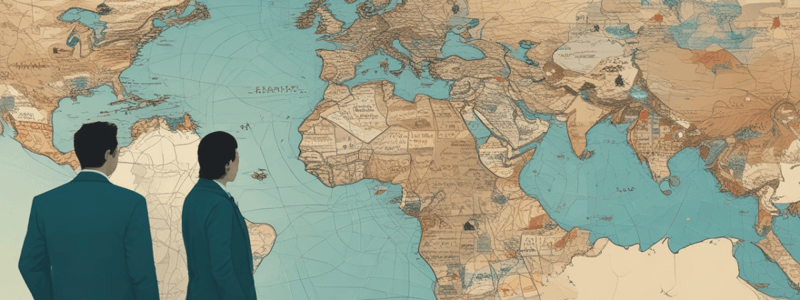Podcast
Questions and Answers
What major action did Joseph Stalin take in 1943 to address the concerns of the United States and the United Kingdom?
What major action did Joseph Stalin take in 1943 to address the concerns of the United States and the United Kingdom?
- He promoted revolutions in Western Europe.
- He signed a peace treaty with Hitler's Germany.
- He dissolved the Comintern. (correct)
- He created the United Nations.
What was the fate of the Comintern after World War II?
What was the fate of the Comintern after World War II?
- It was re-established as the Cominform. (correct)
- It was disbanded permanently.
- It continued to exist unchanged.
- It was transformed into the United Nations.
In the partitioning of Europe post World War II, what area did the Soviet Union influence?
In the partitioning of Europe post World War II, what area did the Soviet Union influence?
- Southern Europe
- Northern Europe
- Eastern Europe (correct)
- Western Europe
What happened to communist internationalism after the collapse of the Soviet Union in 1991?
What happened to communist internationalism after the collapse of the Soviet Union in 1991?
What type of internationalism was ascendant in the postwar period?
What type of internationalism was ascendant in the postwar period?
What organization emerged as the center of global governance after World War II?
What organization emerged as the center of global governance after World War II?
What is highlighted as a critical feature of globalization?
What is highlighted as a critical feature of globalization?
How do international organizations facilitate international relations?
How do international organizations facilitate international relations?
Which of the following is a manifestation of growing interconnectedness in globalization?
Which of the following is a manifestation of growing interconnectedness in globalization?
What is recognized as the most well-known example of an organization that promotes global governance?
What is recognized as the most well-known example of an organization that promotes global governance?
Flashcards are hidden until you start studying
Study Notes
Concept of Nations and Nationalism
- "Imagined" communities allow people to feel connected within a large group without personal acquaintance, exemplified by shared national pride or solidarity.
- A state is characterized by formal government institutions, territorial boundaries, and sovereignty.
- Nations are defined by common characteristics like language, ethnicity, or religion, which may or may not include a defined territory.
- Nationalism helps in state formation, linking the concepts of state and nation closely.
Sovereignty and State Formation
- Sovereignty refers to a state's authority to self-govern.
- The Concert of Europe, including the UK, Austria, Russia, and Prussia, aimed to restore state sovereignty post-Napoleon through the Metternich System.
The League of Nations
- Created under the advocacy of US President Woodrow Wilson post-WWI, aimed at international peace and cooperation.
- Failed to prevent WWII but led to the formation of task-specific organizations like WHO and ILO.
- Based on principles from thinkers like Kant, Mazzini, and Wilson, emphasizing democracy, self-determination, and cooperation among nation-states.
- Mazzini and Wilson viewed nationalism as essential for a cooperative international system, leading to concepts like a United States of Europe.
Internationalism
- Divided into socialist and liberal internationalism, focusing on class struggle and democratic values/global governance, respectively.
- Immanuel Kant proposed a world government to prevent international chaos, similar to societal governance.
- Jeremy Bentham advocated for international law aiming for collective happiness, highlighting fears about world government overpowering individual nations.
- Giuseppe Mazzini reconciled nationalism with internationalism, promoting a cooperative system of free, independent states leading to global cooperation.
Historical Context and Developments
- Attempts to transcend the interstate system included Napoleon’s challenges and envisioning of alternative governance structures.
- The post-WWI era saw movements towards liberal internationalism and the creation of international governing bodies.
- Post-WWII, concerns about communist internationalism arose, especially with the Soviet Union's influence in Eastern Europe.
- The collapse of the Soviet Union diminished communist internationalism, making liberal internationalism predominant, exemplified by the rise of the United Nations.
Globalization and International Relations
- Internationalism represents a facet of globalization, emphasizing increased state interdependence and global connectivity.
- The United Nations exemplifies the increased role of international organizations in facilitating global governance and international relations.
Studying That Suits You
Use AI to generate personalized quizzes and flashcards to suit your learning preferences.




